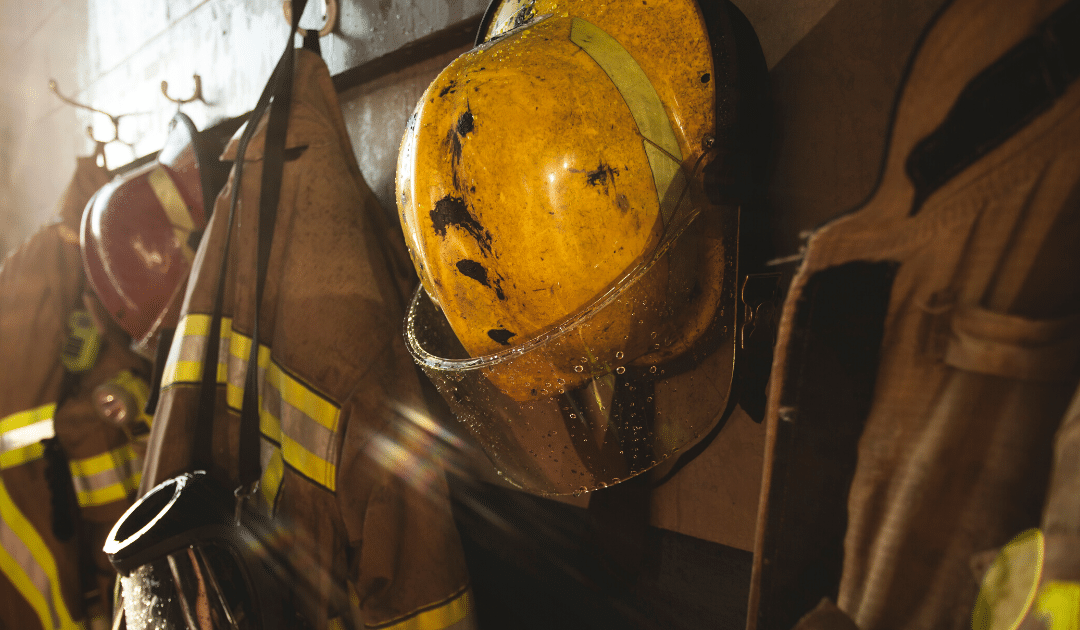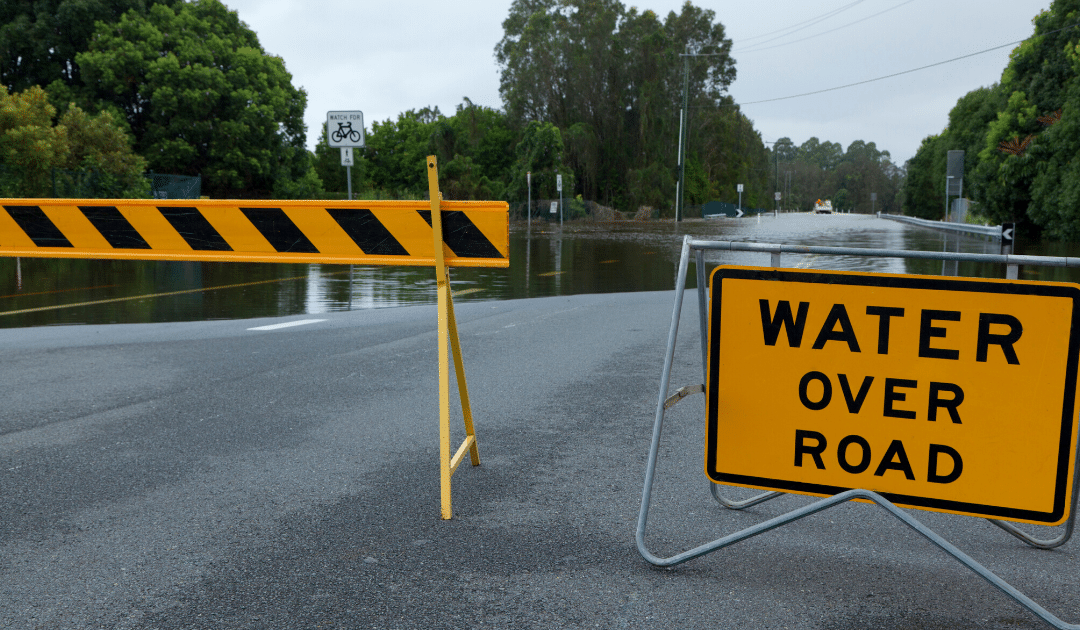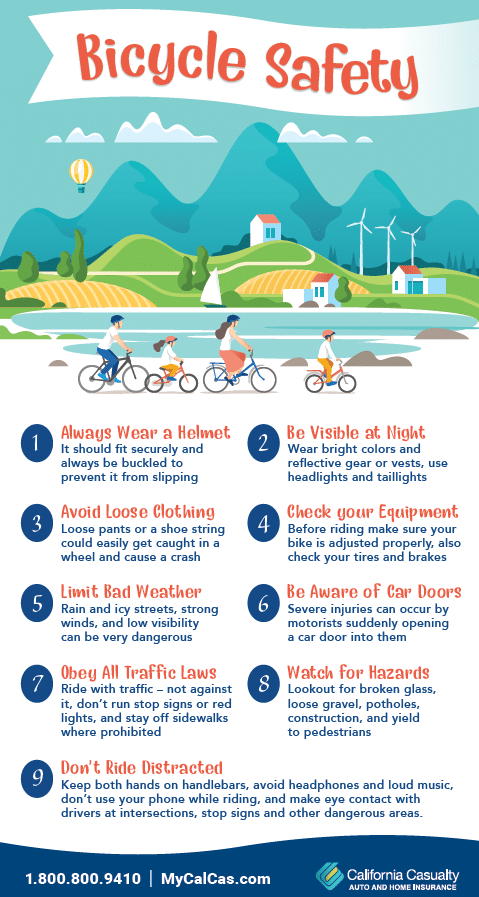
by California Casualty | Pets, Safety |
Just as hot summer days can be dangerous for people, they also put our 4-legged companions at risk of heat stress.
When the temperature soars this season, follow the 9 tips below to keep your pets safe and healthy.
- Never Leave Pets in a Parked Car
In just 10 minutes, the temperature inside your car rises almost 20°F. In 20 minutes, it’s up by 30°F, and in 60 minutes — it’s almost 40°F hotter than the temperature outside. So, even when windows are cracked, your car’s in the shade or “it’ll just take a minute,” never leave your pet in a parked vehicle.
- Keep the Water Dish Full
Making sure your pet has plenty of fresh, clean water is important all the time, but especially when it’s hot or humid out. They can get dehydrated quickly, so keep an eye on their bowl (or put an extra out). And on the topic of pet bowls, what’s the gold standard for cleaning? A daily wash with hot water, air-dry, and once-a-week sanitizing.
- Watch the Asphalt
On hot days, a rule of thumb is to put your hand on the pavement and wait 7 seconds. If it’s too hot, that means it’s unsafe for your dog’s paws, which can suffer burns. Also, remember pets’ bodies are much closer to the ground, so absorb more of the radiating heat and can overheat.
- Mind the Fireworks
They’re why the Thundershirt® was invented. Though some pets are oblivious to fireworks, many are scared and some even terrified. During fireworks-heavy holidays, keep your pets in a quiet, secure area of your home (not outside). And never use fireworks around them, as they can potentially get burned or traumatized.
- Don’t Shave Your Dog
Owners of long-haired dogs sometimes get side-eye while out for dog walks in the summer months, but it turns out that dogs’ coats have evolved to protect them against cold and hot temperatures. Leaving his coat au naturel will help him better regulate his temperature and protect against sunburn. For cats, you can brush them more often during hot weather to help them shed.
- Know How Pets Cool Themselves
Dogs use panting, not sweating, to keep cool. They’ll also seek shady spots and drink a lot of water to replenish moisture lost through evaporation. A cat’s first line of defense is finding a cool surface or dark place to wait out the heat. They’ll also lick their coats more often, which allows saliva to evaporate and cause a cooling effect.
- Watch for Signs of Overheating
Symptoms of overheating include excessive panting, difficulty breathing, weakness or collapse, glazed eyes, increased heart rate, excessive drooling, or vomiting. Their body temperature rises above 104°F and their gum coloration turns bright red, pale or blueish purple. If your pet is overheated, take steps to cool them down (douse them in room temperature water, move them to shade or A/C) and contact your vet immediately. Animals with flat faces (e.g. Persian cats, pugs) are more susceptible to heat stress.
- Keep Exercise Light
Limit your pets’ exercise on especially hot days. Shift walks to the early morning or evening and always carry water to keep your dog from dehydrating.
- Mind the Humidity
It’s not just the temperature, but the humidity, that affects animals. They pant to evaporate moisture from their lungs (thus cooling themselves), so when the water content in the air rises their cooling system is affected. The more humid, the greater risk they face for overheating. Use extra caution on humid days.
Once you know what to look for and pay attention to, keeping your pets safe in the heat becomes second nature.
This article is furnished by California Casualty, providing auto and home insurance to educators, law enforcement officers, firefighters, and nurses. Get a quote at 1.866.704.8614 or www.calcas.com.

by California Casualty | Firefighters, Health, Peace Officers, Safety |
Summer heat is tough for anyone, but firefighters, peace officers, EMTs, and paramedics are at increased risk when heat’s extreme.
First responders are outdoors for extended periods of time, often in the sun. They’re also usually wearing heavy gear such as firefighting equipment, bulletproof vests (for officers), or other bulky protective equipment.
When these factors combine with elevated temperatures, heat stress can set in quickly. So it’s important for first responders and their departments to be well-versed in both the symptoms and best measures for prevention.
Heat-Related Illnesses: A Slippery Slope
Heat stress can progress from mild to life-threatening when symptoms aren’t addressed. Here are the main stages:
- Heat Cramps or Rashes – Caused by increased sweating, cramps, and rashes are the first sign of stress.
- Heat Exhaustion – At this stage, the body is overheating as a result of excessive loss of water and salt.
- Heatstroke – The most serious heat-related illness, heat stroke happens when the sweating mechanism breaks down and is no longer able to cool the body. Heatstroke can be fatal and requires immediate medical attention.
Signs of heat stress aren’t always obvious — brush up on the symptoms of the above conditions here.
Prevention
Preventive measures can be taken by first responders themselves, as well as their crew members, supervisors, and departments. The most successful heat safety protocols are adopted department-wide and include elements such as:
- Hydration – Staying hydrated is the most important tactic for preventing heat illness. Although first responders know the importance of hydration, it can easily be forgotten in the middle of emergency situations. Water should be made accessible at all times to first responder crews, with the encouragement to hydrate well and often.
- Knowing the signs – It’s important that both supervisors and team members know the signs of heat stress, both to self-monitor and to look out for their colleagues. Implementing a buddy system where partner pairs observe each other for signs of heat stress is also a good idea.
- Rest breaks – Rest periods are essential to ensure that workers can hydrate and cool down. They should occur more frequently when temperatures, humidity, or sunshine increases, when air is stagnant, during especially taxing work, and when workers are wearing protective clothing or gear.
- Cooling station – Especially when emergency calls are extended, a temporary set up where responders can retreat and take a rest is important. For instance, some fire stations supply their crews with trailers with a large fan and a mister; some have air-conditioned “rehab trucks” for firefighters on extended calls.
- Training – Before the hot weather begins, employers should provide heat stress training to all workers and supervisors so they’re better prepared. When possible, training should cover conditions specific to that work site or area.
- Heat alert program – When extreme heat is forecast, it’s important for employers and supervisors to implement a heat alert program, and ensure their workforce is safe and on the lookout.
- Acclimatization – First responders can become acclimatized to working in hot environments, gradually increasing their physical stamina and sweating proficiency. Acclimatization is achieved through evidence-based training programs provided by employers.
- Fitness — The risk of heat stress increases with obesity, high blood pressure, heart disease, lack of physical fitness, and certain medications. All the more reason for first responders to improve their diet and exercise where they can.
Finally, although not a factor in heat illness per se, extensive sun exposure over time increases skin cancer risk. A 2017 study in the Journal of the American Medical Association found that skin cancer risk in firefighters is greater than in the general population. Wearing (sweat-proof) sunscreen should be a daily habit.
This article is furnished by California Casualty, providing auto and home insurance to educators, law enforcement officers, firefighters, and nurses. Get a quote at 1.866.704.8614 or www.calcas.com.

by California Casualty | Homeowners Insurance Info, Safety |
We live for those carefree summer days spent splashing in the water, but they may have a dark side- drowning is the leading cause of unintentional death in children ages 1 to 4. It is often silent and quick, meaning it only takes a few minutes of unsupervised time in the water for a tragedy to unfold.
The good news is that by taking the proper safety measures and establishing rules for your pool, you can decrease the risk level of drowning.
While you and your family are having fun in the sun, remember to follow these important summer pool safety tips.
Assess Your Pool Area
First, take a look at your pool and the area around it. There are several things you can do to improve overall safety:
- Pool barrier – Consider installing a fence around your pool to prevent access by children and pets. A 4-sided barrier reduces drowning risk by 83% compared to a 3-sided fence (one that uses the house as the 4th side). Make sure the barrier is at least 4 feet tall and that gates are self-latching and self-closing.
- Secondary barrier – If your home does open directly to the pool, install door alarms and locks that are out of children’s reach.
- Above-ground pools – Make sure to lock or remove steps/ladders or anything else that can be used for pool access in the absence of adult supervision.
- Pool covers – Power safety covers are your best bet for safety. Keep the control device out of reach of kids and ensure the cover is closed when the pool’s not in use.
- Pet doors – Small children can crawl through pet doors, so ensure there are no doors leading directly to the pool. This keeps both kids and pets safe.
- Drain covers – Install anti-entrapment safety drain covers, which will prevent all-too-common entrapment accidents.
- Underwater pool alarm – Consider installing an underwater pool alarm, which goes off whenever anyone enters the pool. They are surprisingly affordable for the peace of mind they offer.
Establish Rules and Safe Behaviors
Having agreed-upon rules and behaviors sets the tone and parameters for safety. Adopt the following and add your own!
- Don’t go in or near the pool unless an adult or water watcher is present.
- Swim with a buddy.
- No diving.
- No running.
- No pushing.
- Stay away from drains and other areas with suction.
- If someone’s in trouble or struggling, get help immediately.
- For adults, swim sober and only supervise others when you’re not distracted.
Prepare for Emergencies and Know the Risks
Keep the following in mind as an added layer of protection.
- Never leave a child unattended around a pool or hot tub. Stay within arm’s reach of young children and anyone who can’t swim.
- If a child is missing, check the water first.
- A silent killer. Drowning is almost always quiet (and quick), not loud and splashy as depicted on TV. All the more reason for a designated water watcher and for all adults to be on high alert when children are in or near water.
- Make sure all family members know how to swim. Everyone should have basic swimming and/or water competency skills. For children still learning, adult supervision and help with competency is essential.
- Minimize your liability. Pool owners are subject to lawsuits if someone is injured or worse in their pool. So, ensure that all rules and safety measures are understood and followed — by anyone using the pool. Consider adding coverage to your homeowner’s policy for liability lawsuits and check on what it covers in the context of pools.
- Share safety instructions with others. It’s a good idea to post pool rules and safety instructions poolside so that everyone — including guests such as friends, family, babysitters and neighbors — sees, knows, and follows them.
Peace of mind is priceless. By adopting the tips above, you can rest easier this summer in and around the pool.
This article is furnished by California Casualty, providing auto and home insurance to educators, law enforcement officers, firefighters, and nurses. Get a quote at 1.866.704.8614 or www.calcas.com.

by California Casualty | Health, Safety |
Emergency preparedness will help you and your family stay safe in the event of a disaster. House fires, flash flooding, and natural disasters can happen anywhere at any time, and as we move into summer- hurricane and wildfire season, the risk for an emergency is even greater.
Coronavirus (COVID-19) has completely changed the way we interact with others- and will for the foreseeable future. That’s why it’s important to take action now to make sure you and your family are prepared for an emergency situation, while still taking the proper precautions to avoid COVID-19.
Here’s how to be prepared for an emergency during the middle of a pandemic.
Make a Preparedness Kit
Emergency Preparedness Kits are kits built for you and your family to have in the event of a disaster. These kits include all essential items that you would need to survive i.e. bottled water, toilet paper, copies of important documents, medication, food, chargers, hygiene items, etc.
The Red Cross recommends that during COVID-19, you should assemble two different emergency kits for you and your family.
Stay-At-Home Kit- This kit should include 2 weeks of emergency supplies. In the event that you or your family are exposed to the virus and you have to self-quarantine you should have everything that you would need to survive for 2 weeks without leaving your home.
Evacuation Kit- This kit should include 3 days of supplies in a “go bag”. It should hold all of your basic needs, yet be lightweight and easy to grab/carry in the event of an emergency evacuation. It is recommended that you have enough supplies for 72 hours. This also includes supplies for your health and safety in large crowds i.e. face masks, sanitizer, alcohol wipes, etc.
The Red Cross also recommends that each kit should have a 1 month supply of prescription medication along with fever-reducing medicine and cough suppressants.
Other Disaster Planning Tips
Making a disaster plan during a pandemic requires planning ahead, because of the need for social distancing. In the event of a natural disaster, sheltering in large buildings like school gyms and community centers may no longer be an option, and you will have to seek shelter elsewhere.
Here are some tips, the Red Cross recommends, to help you and your family develop a disaster plan.
-
- Register for emergency alerts
- Stay up-to-date on COVID-19 advice and restrictions for your state
- Have an evacuation transportation plan
- Have a safe destination set for your family to meet, if you become separated
- Research open lodging (campgrounds, hotels, shelters) and their restrictions, in the event of an evacuation
- Keep enough PPE, disinfectant, and medicine in your emergency kit for your family
- Do not stay with friends or family who have been exposed to COVID-19, are experiencing symptoms, or are at a higher risk of developing the virus
- If you think you have COVID-19 or have been exposed- self-quarantine, keep your distance (if possible), and contact your doctor as soon as you are safe and able.
For more tips click here.
This article is furnished by California Casualty, providing auto and home insurance to educators, law enforcement officers, firefighters, and nurses. Get a quote at 1.866.704.8614 or www.calcas.com.

by California Casualty | Safety |
Floods are the most common of all weather-related natural disasters. They happen in every U.S. state and are more deadly than hurricanes, tornadoes, and lightning.
Among flood events, flash floods can be especially dangerous. Why? They occur suddenly, often without warning. People are caught off guard and usually underestimate the strength, speed, and volume of water. Flash floods can happen within minutes or a few hours of heavy rainfall and can quickly become raging rivers that tear through washes, dry lakes, urban zones, and other low-lying areas.
Flash Flood Alerts: 3 Levels to Know
Staying safe during a flash flood starts with being informed. In the event of heavy rainfall (sustained or sudden), follow your local alert system, NOA Weather Radio, or other emergency advisory for information. Flash flood alerts fall into 3 danger levels:
Flash Flood WATCH—This means flash flooding is possible. A WATCH usually covers several counties. Stay alert and be ready to evacuate if necessary.
Flash Flood WARNING—Issued when flash flooding is happening or is imminent. It’s usually issued for smaller, more specific areas. When a WARNING happens in your area, move to higher ground immediately—you may have only a few seconds.
Flash Flood EMERGENCY—Very rare but issued when there is catastrophic damage and a significant threat to human life.
In the event of a flash flood, whether you’re at home or in the car, here are top tips for protecting yourself.
Staying Safe in Your Car
-
- Never drive through floodwater. Roadbeds may be washed out under the surface, or there could be submerged debris. Also, it only takes 12 inches of rushing water to carry away most cars, and just 2 feet for SUVs and trucks. Remember, when approaching a flooded road: Turn Around, Don’t Drown®!
- Stay off bridges over fast-moving water. Bridges can be washed out with little or no warning.
- Don’t drive around barricades. Crossing a barrier or driving through a road closure can not only put you in extreme danger but also land you a steep fine by authorities.
- Remain in your car if you’re surrounded by fast-moving water. However, if the water starts rising inside your vehicle, exit quickly and get onto the roof.
- Use extra caution at night when it’s harder to assess flood danger.
Staying Safe at Home or On Foot
-
- Avoid flood-prone areas such as canyons, drainage channels, streams and culverts.
- Do not walk into standing water, even if it looks calm. Waters can rise suddenly, and it only takes 6 inches of rushing water to knock an adult off their feet.
- Get to higher ground fast if your home floods. Avoid going to a closed attic, as you may become trapped. Only get on your roof as a last resort.
- Keep children and pets close by.
- Avoid parking near streams or rivers during flood conditions.
Given that floods are a common and widespread occurrence, it’s smart to have your evacuation plan ready ahead of time, as well as an emergency kit and go bag. To protect yourself against damage to your home, consider buying a flood insurance policy.
This article is furnished by California Casualty, providing auto and home insurance to educators, law enforcement officers, firefighters, and nurses. Get a quote at 1.866.704.8614 or www.calcas.com.

by California Casualty | Health, Safety |
Summer is almost here and that means so is bicycle season! Before your child straps on their helmet and takes off down the sidewalk, give yourself peace of mind knowing they are safe by educating them on Bicycle Safety.
Key Bicycle Safety TIPS:
- Wear a helmet
- Avoid night riding
- No loose clothing
- Check your tires & brakes
- Don’t ride in bad weather
- Look at for cars
- Follow the rules of the road
- Always be on the lookout for hazards
- NEVER drive distracted
Save our free Bicycle Safety printable below to give to your children or hang up next to their bike gear as a visual reminder that they can always refer back to.

This article is furnished by California Casualty, providing auto and home insurance to educators, law enforcement officers, firefighters and nurses. Get a quote at 1.866.704.8614 or www.calcas.com.







